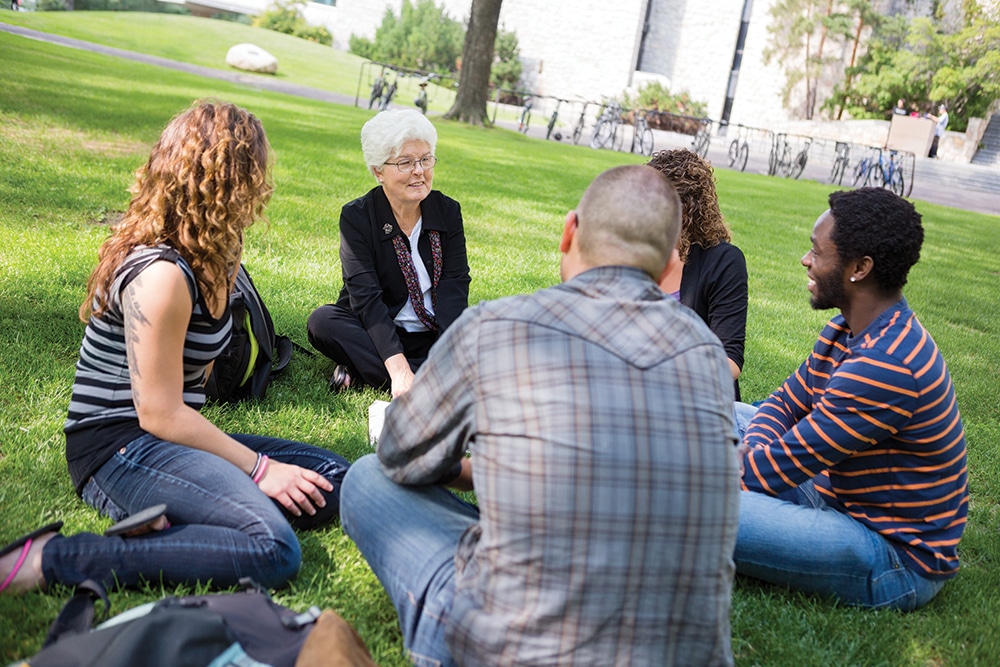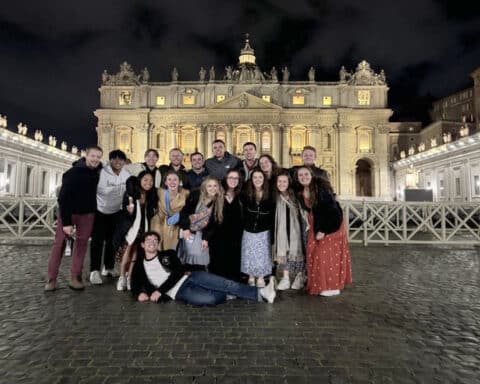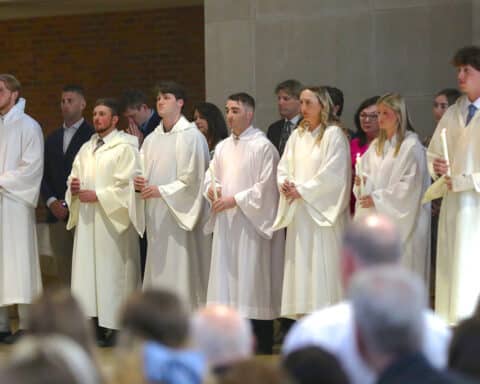We all need role models. In particularly challenging situations, it is good to have someone whom we can imitate or look to for guidance.
The practice of the Faith is more than just a tradition to be kept up or a social nicety. It boils down to the disposition of our eternal souls. College can be a particularly challenging time, when many people question their faith and, sadly, leave it. While they are away from their families at school, college students often search for role models who help form them in the Faith.
On college campuses, the obvious spiritual guide is the chaplain, but professors can play a significant part in helping form college students as people who live their faith outside of the campus church or Newman Center.
Students and professors
“In every academic discipline, there is an opportunity to help students think critically about God’s world and their relationship to him and truth,” said Julie Beeman, chair and associate professor in the department of criminal justice at Belmont Abbey College in North Carolina. While there are opportunities in class to orient the conversation toward God, Beeman said that more frequent opportunities occur outside the classroom.
“I frequently have students come to my office to discuss problems or concerns, and in a Catholic school, I have the freedom to pray with them and openly share God’s love for them,” Beeman said.
| Additional Reading |
|---|
|
Read more articles from our fall Catholic college section here.
|
She said it is critical for professors to be involved in helping form their students as people of faith: “Otherwise we are not educating the whole person. As the adults in the lives of the young students, we have the responsibility to model the integration of faith into our daily life, and sharing it with them is a natural progression.”
A student’s perspective
Mary Lang, a junior at Belmont Abbey College, has had experience with professors being role models in faith. Seeing many professors at daily Mass on campus and having the opportunity to pray alongside them “has brought me closer to them as real people who have experience and lives outside of classroom lectures,” she said. “Professors who have strong faith are better able to convince their students of the truth. Especially in the confused modern world, professors who understand the truth will be an anchor for students who are seeking out that truth genuinely and therefore will be the ones sought after by good students.”
“In my opinion, the primary way that professors can form students in the faith is simply to be a witness — by their own belief and conviction — in the classroom, as well as outside the classroom,” said Emily Felsheim, a junior at Wyoming Catholic College in Lander, Wyoming. Felsheim said that a lived faith can be a great example for students, and that professors who live their Catholic faith with conviction can “plant and cultivate seeds of faith in their students.”
“Whenever I heard a professor speak with certainty and eloquence about some aspect of Catholicism or see one of my teachers at Mass, I think, ‘If these people whom I admire find the Catholic faith compelling, then so should I.'”
Felsheim said that professors primarily should form students academically, but they should also aim to nurture them spiritually.
“As integrated persons of body, mind and soul, we are best educated in an integrated way that touches on all aspects of our person,” she said. During office hours, professors at Wyoming Catholic College will answer questions about homework assignments or class materials, but they are also willing to share spiritual advice or simply talk about life.
“As a student, it’s incredible to know that my professors care for me in this way,” Felsheim said. “It bolsters my faith and helps me grow.”
“While intellectual rigor does not always translate into spiritual fervor, becoming docile to the pursuit of the true, good and beautiful can be the beginning of one’s journey ascending Mount Carmel,” said Rinju Chenet, a junior majoring in classical liberal arts at Wyoming Catholic College. “There is only so far one can travel in the intellectual life without being forced to look inwards into one’s own soul. The professors at our universities should be the first ones we look to in helping us with this transition from the intellectual life to the spiritual.”
Chenet said that professors are the best equipped to help their students in their spiritual journeys, as they have been with them while they wrestle with “the great truths of reality.”
“Whenever we are confronted with a belief that questions beliefs that we currently hold, this leads to practical implications that must be traversed prudently,” Chenet said. “So the professors should be the first ones ready to help their students on such a journey.”
Chenet has had many experiences of his professors helping to form their students as people of faith. One professor regularly hosts students at his home to read and discuss different topics of moral theology.
“This movement from the formal classroom to the casual home environment helps us students feel more comfortable to be more honest about the personal demands of the spiritual life that weight upon us, and our professor helps us in turn in the way that he can,” Chenet said.
Scott Olsson is associate professor of mathematics and natural sciences, and has been at Wyoming Catholic College for 10 years.
“We all spend a lot of time trying to be good teachers, but sometimes basic compassion is far more important,” he said. “I may have helped more of my students fall in love with mathematics by buying them a cup of coffee than by being clever in class!”
The unity of faith and studies needs to be modeled, he said, and nothing is more persuasive than friendship.
“The main thing is to model for the students a unity of life — to show that the intellectual life is compatible with and even enriched by the Catholic life, and vice versa,” Olsson said.
Olsson hopes that his students understand mathematics as a study of God’s creation, in its quantified aspect, “and that we were all made to delight in and explore these beautiful things. In this way, which I can’t pretend to have mastered, I think doing mathematics can be a kind of prayer. There is no division between the life of faith and the true life of the mind.”
Formation by example
At Wyoming Catholic College, as at many other Catholic universities, they try to facilitate and encourage “formation through example,” said Professor Kyle Washut, the academic dean at the school. He has been involved with Wyoming Catholic College since it was founded in 2007, working with many departments and serving on the faculty since 2012. He has seen the school develop and grow since its founding.
“The importance of this formation is twofold: In the first place, students need to integrate their studies with their life of faith,” he said. “Secondly, this whole-person formation helps the student better and more meaningfully learn the material in the classroom.”
“Students respect their professors, and when they see the talented mathematician attending Mass, praying grace before meals or in other ways putting his faith in action, it will inspire them all the more,” Washut said. “Similarly, the more students respect the witness of the professors outside the classroom, the more they will be inclined to trust him when he directs their attention to experiences of wonder at God, or suggests ways to harmonize faith and reason in their study.”
Paul Senz writes from Oregon.





